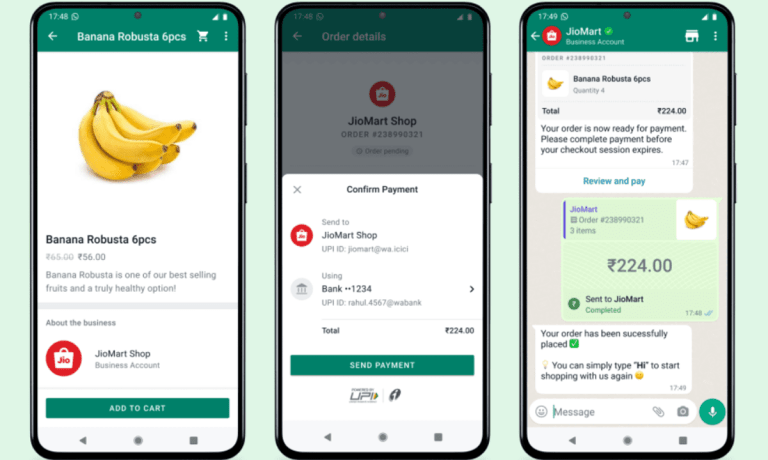Meta Leverages India’s JioMart Grocery to Create Connected Commerce Ecosystem

Meta is taking advantage of consumers’ daily need for food to integrate commerce into its social offerings in India, enabling users to make purchases the same way they interact with their friends.
On Monday (Aug. 29), the company announced the launch of its “first end-to-end shopping experience” through its messaging platform WhatsApp, enabling consumers to shop and make grocery purchases from Mumbai-based Indian eCommerce company JioMart via chat.
See also: Meta Challenges Amazon, Walmart for Share of Indian eCommerce Market
“Excited to launch our partnership with JioMart in India,” Co-founder and CEO of Meta Mark Zuckerberg wrote in a Facebook post. “Business messaging is an area with real momentum and chat-based experiences like this will be the go-to way people and businesses communicate in the years to come.”
The repeated references to this being the “first” such WhatsApp integration suggest intentions to build out the app’s conversational commerce offerings going forward. Starting with groceries makes sense if the company looking to build the habit of ordering this way, given that food is a daily need.
“When Jio platforms and Meta announced our partnership in 2020, Mark and I shared a vision of bringing more people and businesses online and creating truly innovative solutions that will add convenience to the daily lives of every Indian,” Mukesh Ambani, chairman and managing director of JioMart’s owner, Reliance Industries. “The JioMart on WhatsApp experience furthers our commitment of enabling a simple and convenient way of online shopping to millions of Indians.”
PYMNTS research indicates that brands and retailers that can meet consumers’ needs across as many pillars of the ConnectedEconomy™ as possible — how they eat, shop, pay, live, travel, bank, work, communicate, have fun and stay well —have the advantage over those that stay limited to just one. Through this purchasing integration, Meta integrates how consumers eat, shop and pay with how they communicate and have fun.
See also: How Consumers Live in the Connected Economy
The food delivery market in India is highly competitive, with major players such as Zomato and digital payments company Paytm’s eCommerce company Paytm Mall. Granted, Meta has significantly more to gain here than to lose, given that the company is not investing the resources in launching a new food delivery service but rather offering a new way to access an existing player. Still, driving adoption could prove a challenge when consumers have so many other options promising their own versions of on-demand convenience.
Read more: Zomato Buying Grocery Delivery Startup Blinkit for $568M
For instance, the ultrafast grocery delivery category, which struggled to take hold in the United States, is alive and well in India. There is Reliance-backed Dunzo, Zomato-owned Blinkit, and Y Combinator-backed Zepto. All this competition while, according to a Bloomberg report earlier this summer, digital transactions make up only 2% of all grocery retail sales in India.
Additionally, Meta announced this news right before one of the more difficult periods for food delivery players, from an economic standpoint.
“[In] the current September quarter we have rains, which has an adverse impact on the cost for us — the delivery cost,” Zomato Chief Financial Officer Akshant Goyal told analysts on a call earlier this month discussing the company’s first quarter FY23 financial results. “So, we’ll have to watch out how this quarter plays out in terms of how intense the rains are in the country, and that will drive the outcome on delivery cost. But from there on, perhaps … we should see an improvement and reduction in delivery costs going forward.”